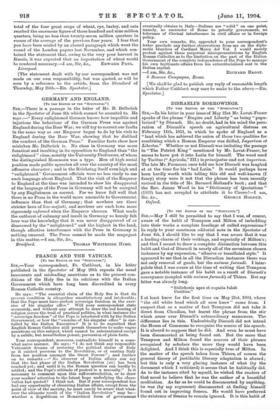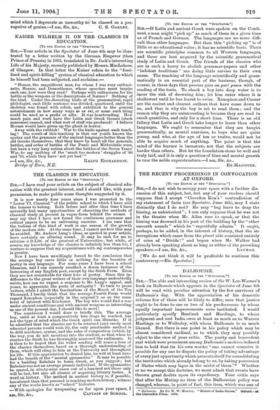[To THE EDITOR OF THE "SPECTATOR."] SIR, — May I still be
permitted to say that I was, of course, aware of the habit of Tennyson and Milton of imbedding into their works a complete fossilage of culled expressions ? In reply to your courteous editorial note in the Spectator of June 4th, I should like to say that I was aware that it was a leading charm of their writings, and especially of Milton's ; and that I meant to draw a complete distinction between this habit and that of Disraeli in nearly all of the seventeen chosen instances by my expression, "allusive or tessellated style." It appeared to me that in all the Disraelian instances there was not only removal of goods, but the animus furandi. I inter- polate that I was aware at the time of writing that Tennyson gave a notable instance of his habit as a result of Disraeli's conveyance (coupled with animus furaadi) of Thiers. But my letter was already long.
" Stilichonis apex et cognita fulsit Canities."
I at least knew for the first time on May 21st, 1904, where "the old white head which all men knew" came from. I suspect that as a matter of fact Tennyson did not take it direct from Claudian, but learnt the phrase from the stir which arose over Disraeli's extraordinary manceuvre. The difference lies in this. Undoubtedly Disraeli did not intend the House of Commons to recognise the source of his speech. It is absurd to suppose that he did. And even he must have been disconcerted at being found out. But the more that Tennyson and Milton found the sources of their phrases recognised by scholars the more they would have been delighted. And I think this is especially true of Milton. In the matter of the speech taken from Tillers, of course the general theory of justifiable literary adaptation is absurd; but this is only a very glaring instance of what (by the document which I criticised) it seems that he habitually did. As to the instance cited by myself, he wished the readers of that novel to believe that he was the author of a beautiful meditation. As far as he could be disconcerted by anything, he was (by my argument) disconcerted at finding himself found out in improving Seneca. He would have preferred the existence of Seneca to remain ignored. It is this habit of rogative of genius.—I am, Sir, &c., C. S. OAKLEY.











































 Previous page
Previous page